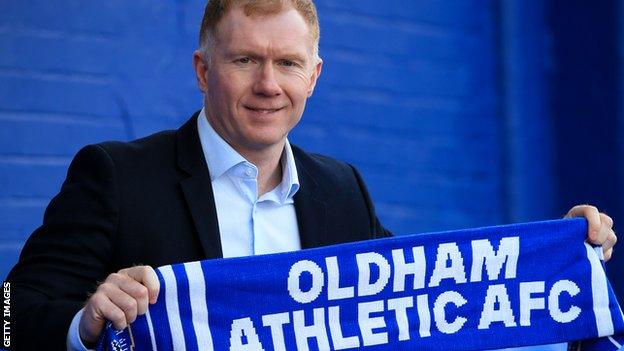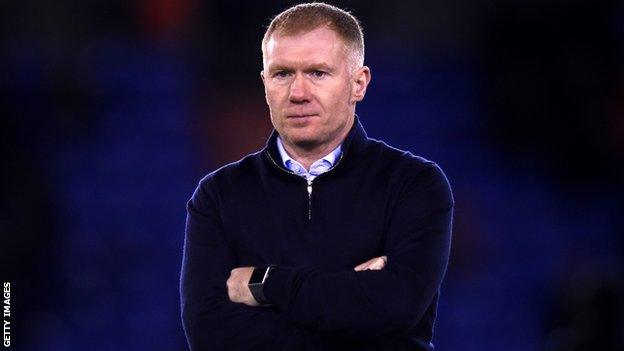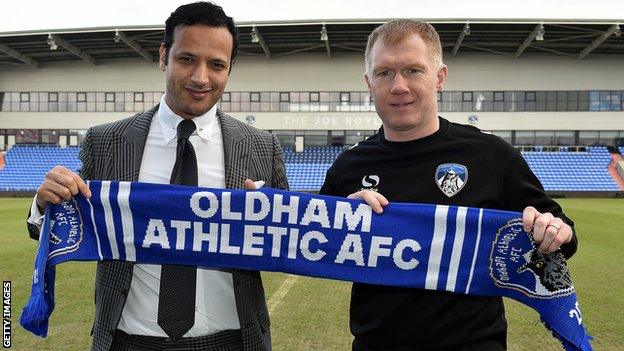Paul Scholes quits Oldham: 'Sadness at what might have been'
- Published

Paul Scholes quit as Oldham manager after 31 days at the League Two club
When it was discovered towards the end of January that Paul Scholes was in talks to become Oldham's new manager, the general reaction was a combination of obvious surprise and then acceptance that this would be an appointment that made sense.
Less than eight weeks later, the news of Scholes' resignation is being digested.
In between there has been one victory, followed by three draws and three defeats.
There have also been arguments, broken promises and disenchantment that cut so deep that one source close to the former England and Manchester United midfielder said his position had become "untenable".
And, as anyone who has watched Scholes' withering condemnation of Manchester United and their managers over the past few years on TV knows, when he feels something is wrong, the 44-year-old does not hold back.
Wind back to Saturday, 16 February.
Scholes sat in what passes for a press room at Boundary Park. Space was tight. Four hours earlier, the same room had been used for a team meeting to discuss Oldham's tactics for the day's League Two match against Crewe.
Instructions had been delivered. To an extent they had been executed. On an awful pitch, Oldham had taken a 23rd-minute lead through Callum Lang. But they had been hanging on when George Ray scored an injury-time equaliser.
Scholes, as he had done for most of the game, tucked his chin into his top and accepted his fate with barely a shrug.
Asked afterwards if he had wondered, at any point, what on earth he was doing there; why he was putting himself through such stress when he clearly doesn't need the money, Scholes responded in typically understated fashion. "Yep," he said. "All week."
He didn't know it at the time but life was to get no better.

Paul Scholes took over with the Latics 14th in League Two and leaves with them in the same position
That same Saturday, Oldham owner Abdallah Lemsagam strolled around Boundary Park in a striking electric blue suit.
He was polite, courteous, happy to chat. But this did not appear to be a man who likes to take a back seat. There had been plenty of rumours before Scholes was appointed that Lemsagam was not afraid of getting heavily involved in team affairs.
It is not hard to work out, in his damning statement confirming he was quitting, what Scholes meant when he said: "Unfortunately it became clear that I would not be able to operate as intended and was led to believe prior to taking on the role."
Lemsagam is said to have been hurt and upset by the statement. Scholes had told his boss of his intention to quit on Wednesday evening. After that, he refused to accept calls.
The crux of the matter, BBC Sport has been told, was Lemsagam's interaction with Oldham's first-team squad.
Scholes felt strongly this was his domain.
Owning a professional lower league club is not a lucrative experience. Understandably, the owner micro-manages. He also likes to chat. He chats to the office staff. He chats to the cleaners. He chats to everyone. This includes players, coaches, physios. Without truly knowing it, Lemsagam was regularly crossing a line.
His previous managers - specifically Richie Wellens and Frankie Bunn - did not like it but largely kept their thoughts to themselves.
Scholes, blunt, experienced and financially secure, did not need to adopt the same stance.
It is understood harsh words were exchanged on more than one occasion. A relationship that needed to be strong gradually worsened.
Players were given contracts Scholes knew nothing about. The pitch was in such a state there was no chance of playing the kind of passing football he would instinctively want to implement.
For Scholes, what had seemed like the dream of managing his hometown club had turned into a nightmare.

Abdallah Lemsagam said Scholes "will have my backing 100%" when the ex-England midfielder was appointed
On Tuesday, Scholes, feeling distinctly under the weather, took his place on the touchline for an away game at Lincoln.
The temperature was freezing. Someone present said Scholes looked like an Eskimo on the touchline. As had been the case against Crewe five games earlier, he barely made a gesture as his team slipped to an expected defeat to the league leaders.
For Scholes, in many ways, it was a grim night.
Fans from both sides went on social media to suggest Scholes was unable to adjust to managing players at a level far below the one he was used to.
This assessment is unfair. Scholes quit long before a worthwhile judgement on his abilities could be made.
Throughout his illustrious club career, Scholes played for one man, Sir Alex Ferguson, whose control over the dressing room was unquestioned. At Oldham, this proved an illusion.
As positions became entrenched and the arguments with his owner became worse, Scholes concluded the hassle was just not worth it.
On Wednesday, having reflected on the futility of it all, Scholes tendered his resignation and severed communication.
Lemsagam fretted. He knew such a sudden end to an appointment made so recently, amid so much fanfare, would reflect badly on him and his club. He wanted the chance to talk Scholes round.
As each hour passed, his hope diminished. Just before 17:00 GMT on Thursday, it came to an end with a searing statement as Scholes explained it was "with great regret" he had not been able to "at least" see out the full 18 months of his contract as manager of "the club I have supported all my life".
All that is left now is sadness and thoughts of what might have been.